Introduction: In this article, Scott Phillips researches old newspapers to find stories about a member of his extended family, the 19th century philanthropist John Huntington—a founding donor of the Cleveland Museum of Art. Scott is a genealogical historian and owner of Onward To Our Past® genealogy services.
While growing up, one of my favorite family weekend trips was to visit the Cleveland Museum of Art. I would marvel at the art, the sculpture, and of course as a young boy, the Armor Court which displayed suits of armor. Later, during my college years, the Museum was my favorite destination as an escape from the pressures of studying. I’d make the 1½ hour drive over to Cleveland and enjoy the art, especially my all-time favorite painting, Water Lilies (Agapanthus) by Claude Monet. Years later during my mother’s 90th birthday family reunion in Cleveland, I was proud that my son and daughter-in-law took our young grandsons to visit the Museum as well.
Amazingly, just a few days ago I learned I had yet another family reason to appreciate the Museum: I discovered that one of my ancestors was a founding donor to establish the Museum.
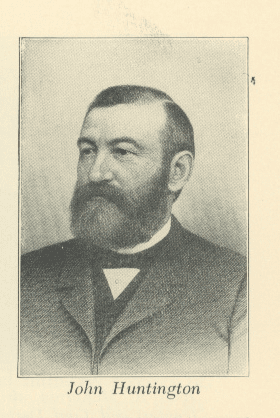
I made this discovery while in the midst of a review of those family tree branches that I had not fully researched. I began work on one of my Bohemian ancestors, Frank Joseph Ptak, who married Margaret Alice Walker. I realized that I had never researched the Walker family, so I began there. After utilizing a few resources, such as the marvelous online database of the Cleveland Public Library’s Cleveland Necrology File, I was deep into searching the newspapers of the time on GenealogyBank.com.
I was diligently reading marriage announcements, obituaries, and a few interesting stories regarding a street assault or two, when a sentence at the bottom of the marriage announcement titled “Dalbey-Leek” caught my eye.
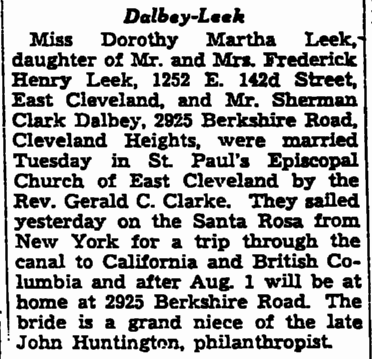
As you can see the line stated: “The bride is a grand niece of the late John Huntington, philanthropist.” Having been a fundraiser myself in an earlier career, I just had to look into this philanthropist. This was especially true since I knew Margaret Alice Walker’s mother was Ann H. (Huntington) Walker.
I took a chance and searched directly on John Huntington, narrowing my search to Ohio newspapers, and my very first result was more than I had hoped for.
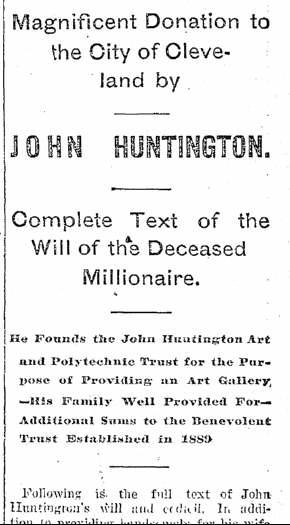
There in the fourth paragraph as “Item 2” were John’s specific legacies to his family members, and he nicely listed each of his brothers and sisters—which included Ann Walker!
I researched further and soon found a very complete article which, while reporting John Huntington’s death in London, England, contained the subheading that included this information: “One of the First Men to Make a Fortune from The Standard Oil Company.”
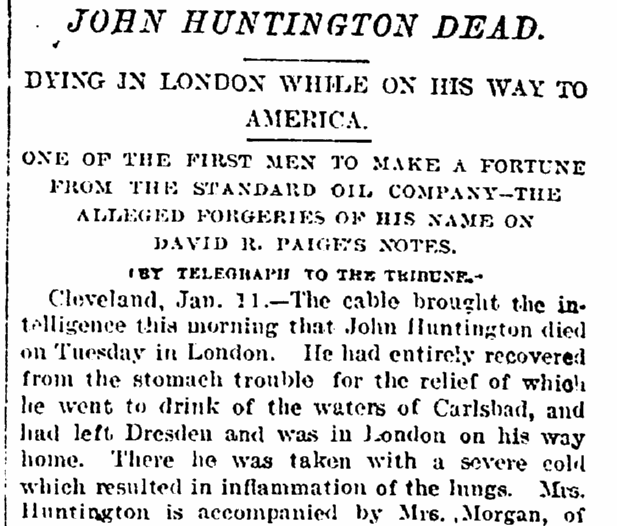
This article also contained reports of his birth date, town, father, his father’s occupation, his living children, and even the report of how his son Arthur had been killed by a train. This article helped me discover the birth records for John Huntington in the United Kingdom, his marriage record, and records for several of his family members.
Out of interest, I searched the newspapers to see if there was an account of the death of Arthur Huntington as mentioned in the New York Tribune. I discovered a gruesome, but complete, accounting of the accident that led to his death.
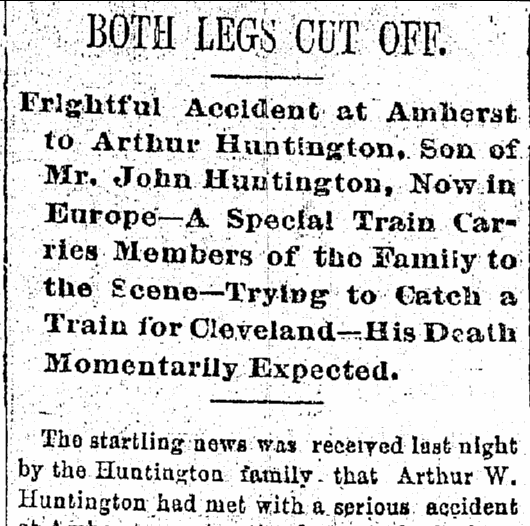
I have to admit the headline “Both Legs Cut Off” sent shivers through me. The next day, on 27 April 1891, the Plain Dealer reported the grim news that Arthur had died from his extensive injuries.
In need of some more cheerful news to finish my day’s research, I came across a delightful article. It reported that the mayor of Cleveland, Newton Baker, was going to dedicate the Cleveland Museum of Art by sitting in the moonlight and having a slice of watermelon on the marble steps.
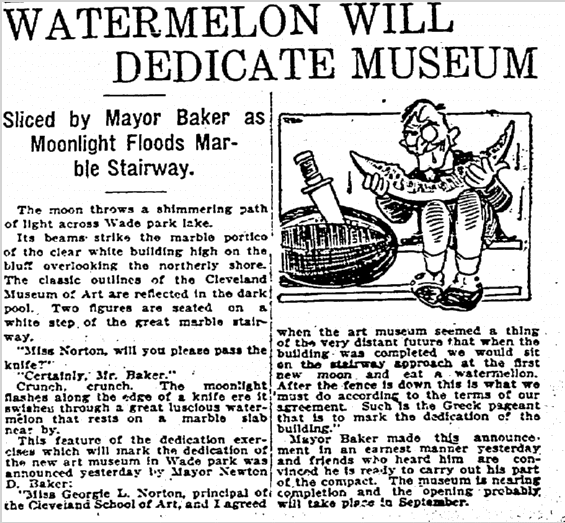
I remember walking up those steps many times, but I don’t recall seeing any watermelon seeds!

I have found out so much about my Great Grandfather Matthew Morgan from newspapers. I know contrary to what people have wrote about him in books, ( he was a some what famous artist ) he did care about people. While out on a boat with his family he helped to save another family who’s boat was sinking, and he almost drowned helping them. He also helped out Mrs Leslie who helped out the woman’s movement. He was a man I wish I could have met.
Ruth, What a delightful find for you! I agree. Often times the newspaper articles can capture a far different view of an ancestor than our family fables can.
It always amazes me to read about someone who risks their own lives to help others. When you add the fact that your ancestor helped out the women’s movement, I am convinced he must have been a worthwhile fellow!
Scott